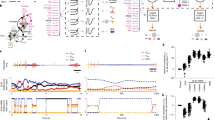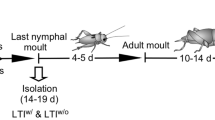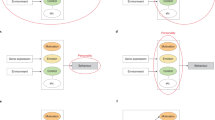Abstract
INSTINCTIVE behaviour is to be regarded, from the biological point of view, as one of the means through which the animal fulfils the biological ends of development, maintenance and reproduction. Now as each species of animal fulfils these ends in a particular way, being after its kind a functional and ecological specialist, we may expect to find that its instinctive equipment, its predisposition to particular perceptions and actions, is also specialized and adapted to its functional requirements, and to the particular environmental complex in which the species normally lives, at different stages of its existence.
This is a preview of subscription content, access via your institution
Access options
Subscribe to this journal
Receive 51 print issues and online access
$199.00 per year
only $3.90 per issue
Buy this article
- Purchase on Springer Link
- Instant access to full article PDF
Prices may be subject to local taxes which are calculated during checkout
Similar content being viewed by others
References
Cameron, E., ‘A Study of the Natural Control of the Pea Moth Cydia nigricana, Steph”, Bull. Entom. Research, 29, 277–313(1938).
Spaier, A., ‘De la nature de l'instinct”, Revue philos., 55, 410–445(1930).
Ullyett, G. C., ‘Host Selection by Microplectron fuscipennis”, Proc Roy. Soc., B, 120, 253–291 (1936).
Russell, E. S., ‘Fish Migrations”, Biol. Rev., 12, 320–337(1937).
Carpenter, G. D. H., ‘Some Notes on the Northern Islands of Lake Victoria”, J. Animal Ecol., 111, 91–104 (1934).
Doflein, F., ‘Der Ameisenlowe”, (Jena, 1916).
Andrews, E. A., ‘The Seventeen Year Locust, alias Cicada”, Quart. Rev. Biol., 12, 271–293(1937).
Myers, J. G., ‘Insect Singers” (London, 1929).
Snodgrass, R. E., ‘The Seventeen Year Locust”, Rep. Smithsonian Inst. for 1919, 408 (1921).
Tillyard, R. J., ‘The Biology of Dragonflies” (Cambridge, 1917).
Hering, M., ‘Biologie der Schmettejlinge” (Berlin, 1926).
Thompson, W. R., and Parker, H. L., ‘Host Selection in Pyrausta nubilalis”, Bull. Ent. Res., 18, 359–64(1928).
Barrows, W. M., ‘The Reactions of the Pomace Fly, Drosophila ampelophila, to Odorous Substances”, J. Exp. Zool., 4 (1907).
Use, D., NATURE, 140, 544 (1937).
Bodenheimer, F. S., ‘Problems of Animal Ecology” (Oxford, 1938).
Lloyd, D. C., ‘A Study of some Factors governing the Choice of Hosts and Distribution of Progeny by the Chalcid Ooencyrtus huvanae Howard”, Phil. Trans. Roy. Soc, B, 229, 275–322 (1988).
Thompson, W. R., ‘Biological Control and the Theories of the Interactions of Populations”, Parasitology, 31, 299–388(1939).
von Frisch, K., ‘Psychologie der Bienen”, Z. Tierpsych., 1, 9–21(1937).
Wood-Jones, F., and Porteus, S. D., ‘The Matrix of the Mind” (London, 1929).
Rights and permissions
About this article
Cite this article
RUSSELL, E. Biological Adaptedness and Specialization of Instinctive Behaviour*. Nature 147, 729–734 (1941). https://doi.org/10.1038/147729a0
Issue Date:
DOI: https://doi.org/10.1038/147729a0
Comments
By submitting a comment you agree to abide by our Terms and Community Guidelines. If you find something abusive or that does not comply with our terms or guidelines please flag it as inappropriate.



